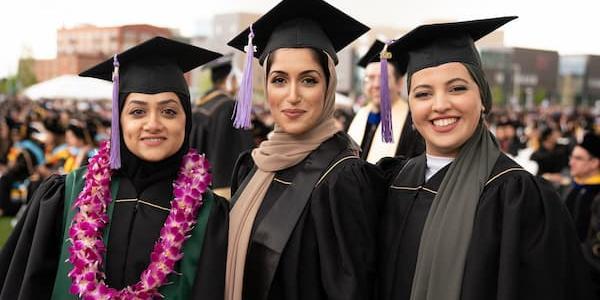Sociology is the scientific study of society and human behavior
Interested? Let us know.
Credit hours: 33
Full-time, part-time
MA in Sociology available in a variety of learning formats (in-person, hybrid, online)
Start terms: fall
Transform your passion for social change into expert knowledge and actionable skills with our Masters program in Sociology. Our faculty specialties in criminology, law, and deviance, medical sociology, urban studies, and families and social welfare are tailored to meet the advanced educational needs of students across Colorado and beyond, offering a variety of learning formats that don't compromise on quality or engagement. Through our curriculum and personalized learning approach, students gain hands-on experience in both qualitative and quantitative research methodologies, preparing them for leadership roles in a variety of settings. Join a network of motivated scholars and professionals dedicated to making a difference in their communities and industries. At the University of Colorado Denver, we're not just adapting to the future of education; we're leading it.
The Master's Program in Sociology at CU Denver blends substantive and methodological training with the flexibility you need for success. All routes through the program require the completion of 33 credit hours, including five required courses, four electives, and six credits in a culminating experience that you choose.
Earn the MA Your Way by completing the program via four different culminating experiences:
- Traditional thesis – Develop and present a comprehensive investigation of a specific research question, employing appropriate methodologies to analyze data and contribute new insights or understanding to the field
- MA report with fifth elective – Extend your class-based learning by taking a fifth elective and complete a brief research report focused on the analysis of a social problem or phenomenon
- Internship with applied project – Gain invaluable real-world experience and make a tangible impact in your community through our applied project option. You'll intern with a local organization, where you'll develop a project that not only aligns with your sociological studies but also supports the organization's mission, under the guidance of experienced mentors
- Extended coursework – If additional class-based learning is what you need, this option is for you! Complete an additional two graduate electives related to your career ambitions and present a portfolio of the work you complete throughout your graduate studies to the Sociology faculty – no thesis, report, or project required.
Whether your goal is to advance your career or to prepare for doctoral studies, our MA program offers a comprehensive pathway to success. Our alumni have achieved rewarding careers across various sectors, from prominent corporations like Zayo and Transamerica to impactful nonprofits such as the Colorado Coalition for the Homeless, and key public institutions like the Colorado Department of Public Health.
Additionally, our graduates have successfully pursued doctoral degrees at esteemed universities including Wisconsin, Washington, Maryland, and Princeton, showcasing the program's strong foundation for advanced academic pursuits.
Our tailored curriculum, enriched with specialized training events, personalized mentoring, and ample networking opportunities, is designed to support your unique ambitions. Coupled with our commitment to fostering research collaborations among our graduate students, the Sociology Department is dedicated to helping you reach your professional and academic goals.
- Emphasis on Methodology - This program distinguishes itself, in part, by its strong emphasis on methodology. All students are required to take 9 credit hours of research methodology and analysis (Research Methods, Quantitative Data Analysis, and Qualitative Data Analysis).
- Urban Environment - Students benefit from studying in a fast-growing and dynamic city that provides a natural classroom for teaching our specialties: Health & Society, Crime, Law & Deviance, Family & Social Services and Community & Urban Sociology.
- Institutional Connections - Our proximity to the University of Colorado Anschutz Medical Campus (AMC) offers unique training opportunities with medical researchers, while our location on the Denver campus, and collaborative relationships with departments on that campus, benefits students in the program.
Students can concentrate in one of four areas by taking three courses in the subject area. At least one of the courses must be taken within the Sociology Department, but the other two can be taken in departments outside of Sociology.
- Crime, Law & Deviance - The focus of this concentration is to provide students with an in-depth understanding of criminology including the social construction of laws, the causes of crime, reactions to law violations, and the prevention, control, and treatment of crime. Additionally, the program teaches students how deviant categories are created, how groups gain control over social definitions, and the consequences these definitions have in the form of norms, laws, and social sanctions. The concentration on crime, law, and deviance also focuses on how legal systems maintain and reproduces social inequalities. This offers an essential foundation for students pursuing careers in criminal justice, victim and community services, criminal law, and non-profit organizations in local and international contexts. Students may ultimately use this degree to conduct social research on crime, influence public policy, and inform government decisions about crime and law.
- Health & Society - Enhancing the health and quality of life for individuals and communities are central goals to societies the world over. Health and medical sociology is a subfield devoted to the study of population health, health care systems and policy, and the social dimensions of illness and healing. Health and medical sociologists study the causes of health inequalities, social constructions of health and illness, origins of medical authority, doctor-patient relationships, community influences on health, and the social forces that affect policy. The Sociology Department's MA concentration in Health and Society provides training in the core research methodologies and theories of medical sociology, examining individual experience, institutional structures, laws and policies that affect health, and broader systems of inequality that lead to unequal rates of illness and access to care. This area of concentration provides in-depth training and is ideal for students interested in further graduate-level study in Sociology, Demography, and Interdisciplinary Health Sciences, as well as those interested in careers in public health, health care services, and non-profit organizations.
- Family, Social Services & Community - Families play a significant part in individuals' lives and society. At the micro or interpersonal level they are a setting for small-group processes such as socialization, conflict, communication and intimacy. At the meso or institutional level they interact with other major social institutions including those affecting education, law, healthcare, religion, the economy, criminal justice, and welfare. At the macro or structural level, the family—in its varied and diverse forms also is key to understanding how inequality is experienced and reproduced in society. The interplay of these multiple levels—the micro or interpersonal, the meso or institutional, and the macro or structural—is important as well as individuals influence social structures and institutions, and the latter, in turn, affect family interactions and relationships. This concentration provides in depth understanding of the complex role of families and family members at multiple levels, as well as the social systems, organizations and communities responsible for supporting families and individuals.
- Community & Urban Sociology - Cities are instrumental sites for the creation, reproduction, and expression of social life. Community and Urban Sociology is a disciplinary sub-field dedicated to the theories and research on communities and urban settlements. Students engage with multiple dimensions of urban and community life in preparation for work in public and community service, government and policy work, and the private sector. Topics emphasized in this concentration include poverty and inequality, racial and ethnic segregation, health disparities, gentrification, housing and homelessness, and the formulation and administration of policies and services addressing these problems. This training offers a foundation for careers in government, human and social services, research, policy analysis, and business, and for continued study in Sociology, Urban and Regional Planning, Demography, Population Health Science, and Public Administration.
The Sociology Department is committed to delivering clear and specific learning outcomes to our graduate students that can be translated into skills related to occupational and educational careers. Our official learning outcomes include the following seven endpoints:
- Demonstrate an understanding of how professional sociology is practiced in academia and in the community.
- Explain the role of research methods in sociology.
- Apply basic quantitative analysis in sociological research.
- Apply basic qualitative analysis in sociological research.
- Compare core sociological concepts and theories.
- Prepare a comprehensive paper or portfolio demonstrating critical thinking skills, methodological rigor, and deep theoretical understanding.
- Apply sociological theory and research to interpret social problems in our community.
Scholarships are awarded from the department annually to our most highly-qualified applicants.
In addition, all applicants from nearly the entire Western half of the United States qualify for in-state tuition via the WICHE interstate tuition reciprocity compact. Do you qualify? Check the WICHE website to learn more.
The University has also provided an online tool to estimate the cost of all our programs.
Sociology MA students are accepted for Fall admission only. Applications submitted by March 15 receive priority consideration for admission and funding opportunities. Applications submitted after the deadline are considered on a rolling basis until June 15th.
Application Materials - Deadline March 15 for priority consideration
Three letters of recommendation (at least two must be from academic/professional sources)
Arrange submission of official transcripts from all schools where BA and graduate credit hours were taken
Statement of purpose and goal of graduate study (Part 2, Question 6 on application).
Writing sample
Optional: GRE score not required, but may be submitted to aid application file
International students: Please contact International Education for requirements and guidance.
Application to the MA program is open to all students holding a BA, BS or higher degree in any field. Students without prior training in sociology may be admitted but may be required to make up deficiencies without graduate credit.
The department does not require a specific GPA for admission but does recommend these standards:
- a combined GPA of at least 3.3 for all courses taken at the undergraduate or graduate level prior to admission.
- a combined GPA of at least 3.5 for all sociology courses at the undergraduate or graduate level prior to admission.

Inclusion is our value
CU Denver is home to one of the most diverse student populations in Colorado.
- Join your choice of 100+ student groups and organizations which support your identity and interests
- Your department and faculty are committed to the pursuit of equity and inclusion in the classroom, lab, and beyond
- Learn more at our Office of Diversity, Equity, and Inclusion

Scholarship Spotlight
Want to know why many patients skip out on using food aid referrals from clinics? This new study, co-authored by CU Denver Sociology alum Danielle Maestas, PhD candidate at Northeastern University, explores the impact of neighborhood layout and how far away food pantries are on people's ability to access the food help they need.
Curious how work and family life have evolved in the U.S. due to changing norms and policies? Sociology alum Grace Venechuk (PhD candidate at Wisconsin) authored a study published in JHSB examining how these shifts impact job quality and stress levels. The study of over 3,000 adults reveals different stress patterns between men and women, highlighting the complex role of job characteristics and family formation.

Come Join Us!
"The Master's program launched my educational journey by providing a unique community, close mentorship, and hands-on training in quantitative methods. It prepared me to pursue a PhD in my current program at Princeton University—preparation I attribute to the mentorship I received at CU Denver." – Beza Taddess, class of 2022
Interested? Let us know.

